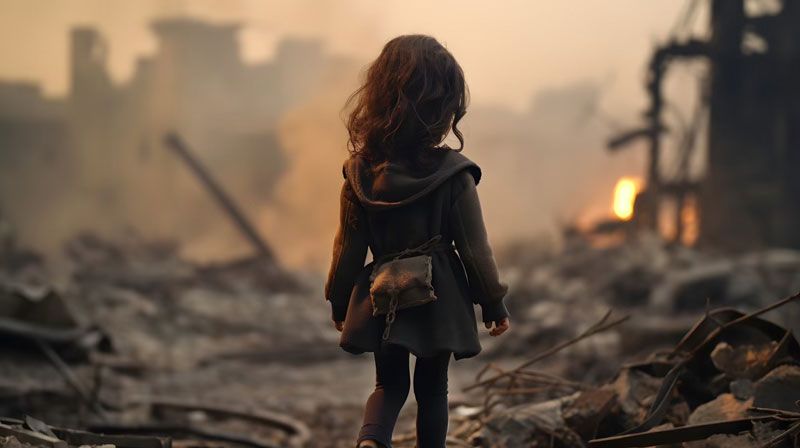Unity, Not Division – The Israel – Palestine Conflict
In a time where we need unity, never have I seen my generation be more divided. While some see Israel’s actions as a response to the attack provoked by an extremist group – Hamas, others see Israel’s actions as genocide with the provocation from the Hamas as an excuse, and social media is not helping.
In the age of social media, misinformation, politically-motivated agendas, and biases – there is no source of truth and we are headed for a very divisive time, once again.
In a media briefing on October 13th, hosted by Ethnic Media Services, this divide was evident, with journalists and speakers fiercely debate each other on which side is hurting more. It was like a verbal bull-fight, each side declaring they have it worse and should get more support. This raises the question, are we headed for the unimaginable – WW3?
Speakers
![]()
- Fatin Jarara (she/her), New York-based Palestinian community organizer, having organized with Al-Awda NY: Palestine Return Coalition for 20 years.
- Brian Levin, Esq. Founder, Center for the Study of Hate and Extremism, Professor Emeritus Criminal Justice, California State University, San Bernardino
- Jamal Dajani, Palestinian-American Journalist, and an award-winning producer. Co- Founder of Arab Talk Radio. San Francisco Human Rights Commission
- Estee Chandler, Jewish Voice for Peace, Los Angeles Chapter Organizer
Those without a rock for a roof, know about the atrocities taking place in Israel and Palestine. The conflict has spilled over to the United States and our generation faces, yet another mounting challenge.
Pilar Marrero introduced the discussion by acknowledging the topic’s sensitivity and the potential for manipulation and misinformation. She emphasized understanding the conflict’s impact on ethnic communities throughout the country. This leads into an elevated conversation reflecting on the centuries of conflict faced in Israel and Palestine.
Jamal Dajani, a Palestinian-American jounarlist, kicked off the briefing discussing the current violence in Gaza and the West Bank, highlighting the immense destruction and the growing number of casualties, particularly among children. He criticized the U.S. administration for seemingly giving Israel the green light to continue military action.
Dajani suggested that this conflict has potential to escalate and drag other regional players into the crisis. He expressed the need to understand that the ongoing crisis is not happening in a vacuum but is a repeated pattern due to Palestinians not realizing any advancement in negotiations or aspirations for the past seventy-five years.
Estee Chandler, an organizer for Jewish Voice for Peace in Los Angeles, critically questioned the credibility of the Anti-Defamation League, referring to it as a Zionist organization. She suggested that the organization’s criteria for classifying an incident as anti-Semitic differed significantly from general public understanding, potentially extending to pro-Palestine rallies on campuses.
She is committed for the safety and freedom for both Israelis and Palestinians alike in light of the current conflict situation. Estee calls for accurate reporting of what is actually going on in the battlefields, to show that issue expands beyond a nation and a militant group.
Brian Levins spoke about his research on historic patterns of hate crime. He stated that the number of hate crimes already increased in 2021, with a record number of such crimes reported. He touched upon how hate crimes become more elongated in their spike, meaning that there is an extended period of elevated hate crime rates following specific events.
Levin also touched upon the significant increase in anti-Muslim hate crimes, correlating it with divisive political campaigns and incidents of terrorism. He pointed out that these numbers are probably even higher than reported due to underreporting within certain communities. Levin emphasized the role of invective speech in fueling hate crime spikes. He called for leaders, both civil and faith, to behave more responsibly.
Fatin Jarara, a Palestinian-American activist, spoke passionately about her perspective painted by the experiences of her people. Palestinians are witnessing daily violence and escalating human rights violations. She pointed out how Palestinians had to display graphic images just to capture the attentions of those misinformed of the true current situation.
Jarara challenged if mainstream media is actually neutral, accusing it of manipulative narratives and marginalizing Palestinian voices. She criticized authorities, including Joe Biden, for their shallow acknowledgment of the Palestinian plight and called out the dismissiveness towards communities like hers. She asserted Palestinians’ resistance against the Israeli occupation, reminding that it’s their struggle for the right to a dignified life on their own land.
The conflict between Israel and the Hamas is not one to overlook. The panelist shed light on the multifaceted conflict and the impact on the US as a whole. The conflict has lead to the spread targeting hate crimes around the world, be it towards the Jews or the Muslims. Media and leaders don’t seem to grasp how this game of pointing fingers is impacting the coming generations. We simply do not need more division, we need unity.


